|
|
|
Sort Order |
|
|
|
Items / Page
|
|
|
|
|
|
|
| Srl | Item |
| 1 |
ID:
170368
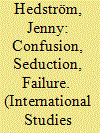

|
|
|
|
|
| Summary/Abstract |
This article highlights the influence of emotions, affective experiences, and rumors on the construction of knowledge within research on conflict and in international politics, as well as within the research process itself. Drawing from fieldwork undertaken in a conflict zone in Myanmar, it suggests that academic knowledge production practices are informed both by the (violent) context in which research is undertaken and by the demands of the discipline to produce a scientifically accepted piece of research. It proposes that attention to emotions may facilitate strong objectivity (Harding 1992) by foregrounding the relationship between research participants, researchers, and the broader research (institutional and immediate) contexts. It introduces the term “rumors-as-affect” as a means to discuss how affective atmospheres or events in the research environments inform research. Three interview situations are presented, in which different emotional reactions are highlighted, focusing on “confusion and guilt”; “seduction”; and finally, “failure and ignorance.” These events illustrate how, in recognizing the role emotions and affective atmospheres play in research on conflict and in international politics (cf. Crawford 2014; Hutchison and Bleiker 2014; Ross 2013), researchers may begin to do justice to our representations of what is encountered in the field and how knowledge is constructed within the discipline.
|
|
|
|
|
|
|
|
|
|
|
|
|
|
|
|
| 2 |
ID:
170369
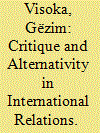

|
|
|
|
|
| Summary/Abstract |
This article critically interrogates the episteme of alternativity in international relations (IR) to rethink the purpose of critical knowledge in global politics. It questions what critical knowledge is for and whose purpose it serves. While alternativity is the very condition that has given rise to critical approaches, there is a deep-rooted division among critical scholars regarding the relationship between criticality and alternativity. This article argues that alternativity provides an opportunity for critical scholars to remain relevant without being affiliated with positivist logics of inquiry. In examining the potential of alternativity, the article explores three modes of alternativity in peace and conflict studies: critique-without-alternative, critique-as-alternative, and critique-with-alternative. It probes the merits and limits of the episteme of alternativity in generating new possibilities for advancing emancipatory interests and saving critical theory from losing its original transformative impetus. In the final part, the article explores future directions for rejuvenating the purpose of critique by exploring the nexus between criticality and alternativity on postparadigmatic and practical grounds.
|
|
|
|
|
|
|
|
|
|
|
|
|
|
|
|
| 3 |
ID:
170365
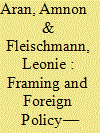

|
|
|
|
|
| Summary/Abstract |
The eruption of the 2010 Arab uprisings has generated a great deal of academic scholarship. However, the foreign policy of Israel, a key power in the Middle East, amid the Arab uprisings, has received limited attention. Furthermore, as we demonstrate, the conventional wisdom purported by the current debate, which is that Israel adopted a “defensive, non-idealist” realist foreign policy posture (Magen 2015, 114) in the wake of the Arab uprisings, is wrong. Rather, utilizing an innovative approach linking foreign policy analysis (FPA) and the literature on framing, we demonstrate that Israel adopted a foreign policy stance of entrenchment. This posture is predicated on peace for peace not territory, reinforcing Israel's military capabilities, and granting limited autonomy to the Palestinians under Israeli occupation. Thus, the article demonstrates how framing can usefully be operationalized to uncover how binary discourse does not merely reflect foreign policy but is, in fact, constitutive of it. We demonstrate that diagnostic and prognostic frames helped to create a direct connection between the images held by a leader, his/her worldview, ideas, perceptions and misperceptions, and foreign policy actions. These frames constituted action-oriented sets of beliefs and meaning that inspired and legitimated certain foreign policy options and instruments while restricting others.
|
|
|
|
|
|
|
|
|
|
|
|
|
|
|
|
| 4 |
ID:
170370
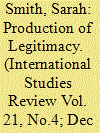

|
|
|
|
|
| Summary/Abstract |
Peace operations have increasingly sought to demonstrate their legitimacy in the face of critiques that characterize them as top-down impositions with limited impact and which entail a host of unintended consequences. Each book under review explores in depth the institutional consignment and attribution of legitimacy to certain spaces, actors, and bodies, which can serve to confirm and embed hierarchical relations of power. Von Billerbeck delineates the ambivalence with which “local ownership” is deployed in peace operations, closing down knowledge exchange rather than presenting opportunity. Shepherd builds on similar insights and argues that gendered logics and power inform the conceptualization and deployment of “local” and “civil society” and thus the (relative) lack of legitimacy afforded to these spaces. This essay seeks to develop from these insights further, drawing especially on postcolonial and critical race theory to demonstrate how race and racism structure the production and use of such categories, in both peace operation practice and international relations more broadly.
|
|
|
|
|
|
|
|
|
|
|
|
|
|
|
|
| 5 |
ID:
170366


|
|
|
|
|
| Summary/Abstract |
In recent decades, international events and incisive critical voices have catapulted the concepts of race and religion to the foreground of International Relations research. In particular, scholars have sought to recover the racialized and imperial beginnings of IR as an academic discipline in the early-20th century. This article contributes to this growing body of work by analyzing both race and religion as conceptual tools of scientific imperial administration—tools that in the 19th century classified and divided the global periphery along a continuum of civilizational and developmental difference. The article then applies this framework to the case of French, and more broadly, European, relations with populations in the Ottoman Empire, particularly within the Syrian Provinces. As described throughout this article and the case study, the Europeans used the language of race to contribute to religious hierarchies in the Syrian provinces in the mid- and late-19th century, having a lasting effect on discussions of religion in IR and international politics.
|
|
|
|
|
|
|
|
|
|
|
|
|
|
|
|
| 6 |
ID:
170362


|
|
|
|
|
| Summary/Abstract |
While existing literature on collective trauma in international relations represents a vital (albeit inchoate) contribution to the field, to date, it has largely analyzed collective trauma’s impact as primarily psychological and sociocultural. This essay argues that a complete vision of collective trauma in IR must incorporate not only these more intangible dimensions but also how its legacy is reified materially over time in economic conditions—distinguishing the trauma of those with the resources to “work through” and those without. I begin this essay with a novel conception of collective trauma that draws upon existing traditions’ insights but also facilitates mediation between collective trauma’s material and sociocultural dimensions. Employing this definition, I then outline three analytical frameworks via which future scholarship can address collective trauma in international economic relations. First, scholarship can incorporate a notion of the trauma of poverty. Second, scholars can analyze the loss of economic opportunity that trauma entails as akin to Dominick LaCapra’s concept of structural trauma of absence. Finally, scholarship can examine collective trauma’s ability to break down trust in institutions and the impact this breakdown has on international economic relations.
|
|
|
|
|
|
|
|
|
|
|
|
|
|
|
|
| 7 |
ID:
170363


|
|
|
|
|
| Summary/Abstract |
This article utilizes van Gennep's neglected theory of territorial passages to answer two key questions in the study of ontological security (OS) in migration. First, why do the members of the receiving society lose their perceived sense of OS in face of a mass of strangers arriving at their gates? Second, how, if at all, do they attempt to reconstitute it while incorporating the strangers into their world? Following the recent call within OS studies in international relations (IR) to spell out the social mechanisms that facilitate the anxiety and uncertainty of the agents, I use the case of the German societal response to the 2015 refugee crisis to demonstrate that van Gennep's classical approach, far from being structural and functionalist, offers an advanced, power-informed, and processual perspective for uncovering a possible sociosymbolic mechanism behind the perceived “losing” and “re-finding” of OS in migratory encounters. The article delineates the principles of a “thick” approach to OS in migration, explains how van Gennep's theory adds to this approach, and highlights the ultimate unattainability of OS as an essentialist category that is either “present” or “absent” throughout the migratory encounter. It concludes by discussing the added value of van Gennep's theory to the study of OS in the contemporary global milieu of the “age of migration.”
|
|
|
|
|
|
|
|
|
|
|
|
|
|
|
|
| 8 |
ID:
170364
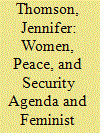

|
|
|
|
|
| Summary/Abstract |
Since the inception of United Nations Security Council Resolution 1325 (UNSCR 1325) in 2000, feminist academia has been closely interested in the developing women, peace, and security (WPS) agenda in international affairs. The majority of this work has emerged from within feminist international relations (Mcleod 2015; Shepherd 2008) and feminist legal studies. Less attention has been paid to the WPS agenda by feminist political science. As a result, less consideration has been given to political institutions within the WPS framework.
|
|
|
|
|
|
|
|
|
|
|
|
|
|
|
|
|
|
|
|
|